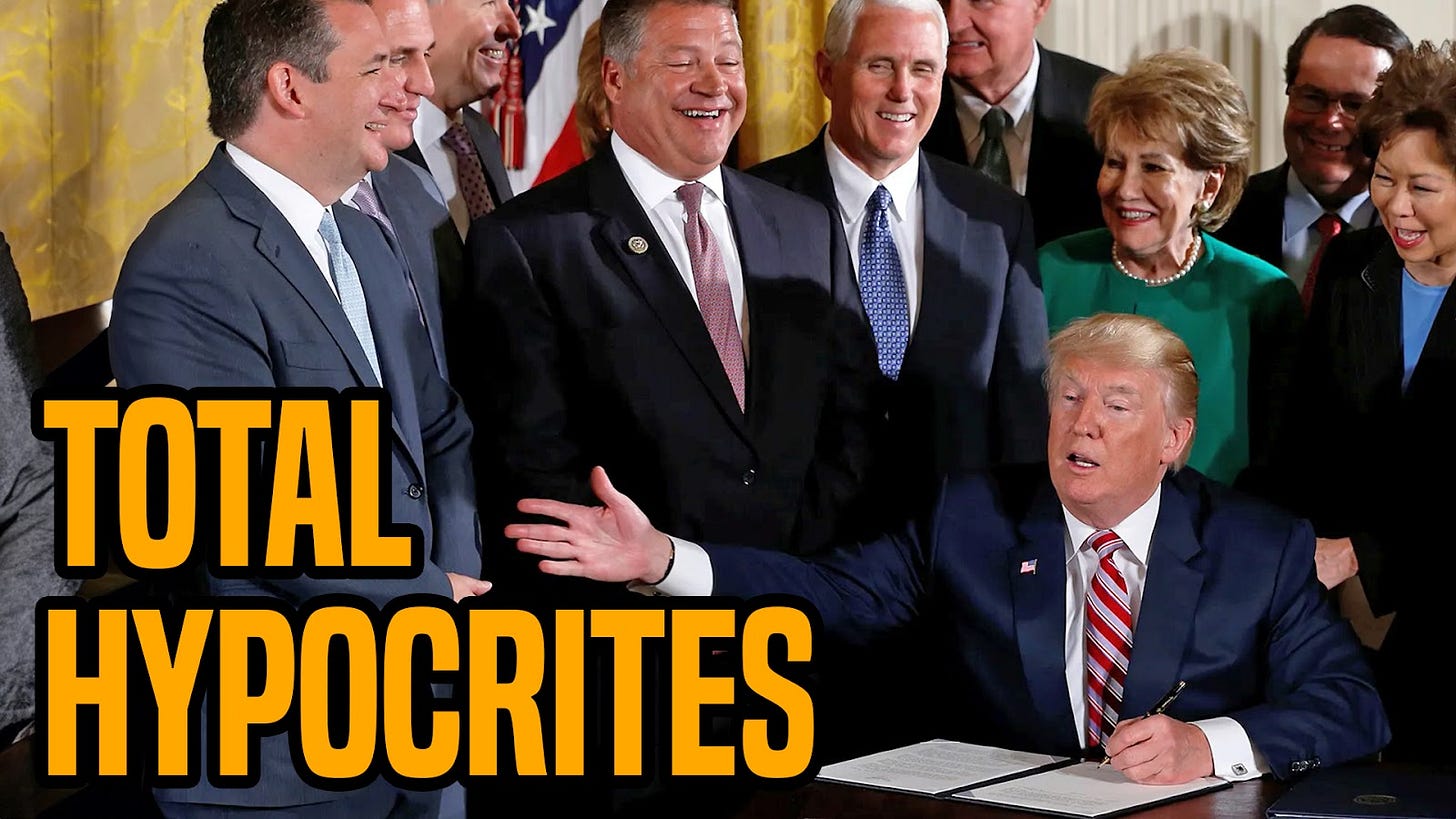OP-ED: Trump Violated Every Single Republican Principle
And yet they still support him
The Trump era has been nothing short of a seismic shift in American politics, particularly within the Republican Party. Nearly a decade into this transformation, it's crucial to reflect on just how much the GOP has changed under the influence of Donald Trump. What becomes painfully evident is that virtually every conservative principle once staunchly defended by Republicans has been either trampled upon or abandoned outright in favor of allegiance to the man himself.
Law and Order, a rallying cry of conservatives for decades, has tragically devolved into nothing more than a hollow slogan for the right in the Trump years. While Republicans have historically championed tough-on-crime policies and unwavering respect for law enforcement institutions, the Trump administration's actions have painted a starkly different and deeply troubling picture. The former president is currently in the middle of a criminal trial and has three more upcoming, facing a total of 88 felony counts of everything from election fraud to storing the nation’s top secrets at his Florida resort. His repeated attempts to claim immunity from prosecution serve as a chilling reminder of his belief that he stands above the very legal principles he swore to uphold, further eroding the foundations of justice and accountability in American democracy.
Respect for institutions, long considered a cornerstone of conservative ideology and a bedrock of American democracy, has tragically crumbled under the relentless assault unleashed by Donald Trump during his tenure in the Oval Office. Trump's brazen attacks on the pillars of governance have reverberated across the nation, leaving a trail of institutional decay in their wake. From his reckless labeling of federal judges as biased based on their ethnicity to his relentless undermining of the credibility of intelligence agencies, Trump's disdain for the foundational principles of governance has reached alarming proportions. However, perhaps most distressing is his outright refusal to accept the outcome of the 2020 presidential election, a cornerstone of democracy itself. His feverish attempts to overturn the legitimate results of the election culminated in the shocking and unprecedented attack on the Capitol, a direct assault on the very heart of American democracy and an event that sent shockwaves around the globe.
Fiscal responsibility, once proudly touted as a badge of honor within the Republican Party, has been relegated to the annals of history under the presidency of Donald Trump. Despite campaign promises to rein in government spending and even eliminate the national debt entirely within a mere eight years, Trump's tenure witnessed a staggering departure from these fiscal conservative principles. Instead of implementing prudent fiscal policies, his administration embarked on a spree of reckless spending and ill-advised tax cuts that only served to exacerbate the nation's already burgeoning debt. With each passing year, the national debt ballooned to unprecedented levels, with Trump adding $8.4 trillion to the debt during his term. In the face of mounting economic challenges and a precarious fiscal landscape, Trump's abandonment of fiscal responsibility stands as a stark betrayal of the principles that once defined the Republican Party.
Personal responsibility, a foundational mantra often wielded by Republicans to advocate against perceived government overreach and promote self-sufficiency, finds itself conspicuously absent in the rhetoric and actions of Donald Trump. Rather than embodying accountability for his own missteps and errors, Trump has mastered the art of deflecting blame onto others, adamantly refusing to accept responsibility for his actions or decisions. This pattern of behavior stands in stark contrast to the ethos of personal responsibility that Republicans have long championed, further highlighting the glaring inconsistency between Trump's leadership style and traditional conservative principles.
Even on the global stage, where Republicans once stood as stalwart defenders against adversaries such as Russia, Trump's deferential stance towards Vladimir Putin and other authoritarian regimes has raised profound concerns. Whether casting doubt on the assessments of US intelligence agencies or engaging in conspicuous displays of admiration for autocratic leaders, Trump's foreign policy approach represents a marked departure from the principled stance historically embraced by the GOP. This departure not only undermines America's standing as a global leader but also threatens to erode the values of democracy and human rights that Republicans have traditionally upheld.
The list of departures from traditional Republican values under Trump's leadership is extensive and alarming. From his implementation of protectionist trade policies that defy the principles of free-market economics to his indifference towards meaningful entitlement reform, Trump's actions have consistently diverged from the party's traditional platform. Moreover, his disregard for the sacrifices of military service members and his failure to embody the religious morality often espoused by Republicans serve as further points of contention within the party.
In the face of such blatant betrayal of conservative principles, one might reasonably expect a reckoning within the Republican Party, a collective soul-searching and reevaluation of its core values. However, what we instead witness is a disturbing display of unwavering loyalty to Trump, with the party sacrificing its own principles on the altar of blind allegiance. The conspicuous absence of a party platform in 2020 speaks volumes about the GOP's capitulation to the cult of personality surrounding Trump, underscoring the extent to which the party has forsaken its ideological moorings in favor of fealty to its leader.
As traditional Republicans like Mitt Romney, Paul Ryan, and George W. Bush express their dismay at the direction of the party, it's clear that the GOP has lost its moral compass. Trump's grip on the party is a testament to the power of personality over principle, leaving us to wonder if there's any room left for integrity in modern conservatism. Until Republicans muster the courage to break free from the shackles of Trumpism, they remain complicit in the erosion of the very values they once claimed to hold dear.




How did Trump get so popular and demanding loyalty no matter what?
Quelle surprise.